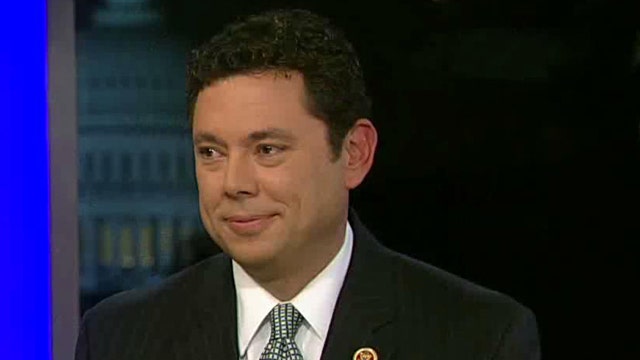Rep. Chaffetz completes 'homework assignment' for Greta
Greta wanted the Utah congressman to find potential solutions to problems in addressing illegal immigration. He didn't disappoint
WASHINGTON – Bipartisan immigration legislation emerging in the Senate could prevent hundreds of thousands of immigrants in the U.S. illegally from ever becoming citizens, according to a Senate aide with knowledge of the proposals.
The bill expected to be unveiled next week would bar anyone who arrived in the U.S. after Dec. 31, 2011, from applying for legal status and ultimately citizenship, according to the aide, who spoke on condition of anonymity because the proposals had not been announced.
It also would require applicants to document that they were in the country before Dec. 31, 2011, have a clean criminal record, and show enough employment or financial stability that they're likely to stay off welfare.
Those requirements could end up excluding hundreds of thousands of the 11 million immigrants in the U.S. illegally from the path to citizenship envisioned by the bill, the aide said.
Although illegal immigration to the U.S. has been dropping, many tens of thousands still arrive each year, so the cutoff date alone could exclude a large number of people. That may come as a disappointment to immigrant rights groups that had been hoping that anyone here as of the date of enactment of the bill could be able to become eligible for citizenship.
But Republicans in the immigration negotiating group had sought strict criteria on legal enforcement and border security as the price for their support for a path to citizenship, which is still opposed by some as amnesty.
The new details emerged as negotiators reached agreement on all the major elements of the sweeping legislation.
After months of arduous closed-door negotiations, the "Gang of Eight" senators, equally divided between the two parties, had no issues left to resolve in person, and no more negotiating sessions were planned. Remaining details were left to aides, who were at work completing drafts of the bill.
"All issues that rise to the member level have been dealt with," Sen. Chuck Schumer, D-N.Y., said in a statement. "All that is left is the drafting."
Democratic Sen. Dick Durbin of Illinois said the bill probably would be introduced on Tuesday.
The landmark legislation would overhaul legal immigration programs, require all employers to verify the legal status of their workers, greatly boost border security and put the estimated 11 million immigrants living in the U.S. illegally on a path to citizenship. A top second-term priority for President Barack Obama, it would enact the biggest changes to U.S. immigration law in more than a quarter century.
Deals gelled over the past day on a new farm-worker program and visas for high-tech workers, eliminating the final substantive disputes on the legislation.
Next will come the uncertain public phase as voters and other lawmakers get a look at the measure. Already, some on the right have made it clear their opposition will be fierce.
Once the legislation is released, it will be considered by the Senate Judiciary Committee, which has scheduled a hearing for next Wednesday and will likely begin to amend and vote on the bill the week of May 6. From there, the bill would move to the Senate floor.
Both in committee and on the floor, the bill could change in unpredictable ways as senators try to amend it from the left and the right. The Gang of Eight -- Schumer, Durbin, and Sens. John McCain and Jeff Flake, R-Ariz., Marco Rubio, R-Fla., Lindsey Graham, R-S.C., Robert Menendez, D-N.J., and Michael Bennet, D-Colo. -- have discussed banding together to defeat amendments that could significantly alter the legislation.
Even more uncertain, though, is the conservative-led House, where a bipartisan group is also crafting an immigration bill, though timing of its release is uncertain. Many conservatives in the House remain opposed to citizenship for immigrants who have been living in the U.S. illegally.
In addition to the new details on criteria for future citizens, other significant elements of the Senate legislation are also known, through comments from senators or aides, leaks or statements by outside groups.
The bill is expected to provide a 13-year path to citizenship for people living here illegally who qualify, but only after a new southern border security plan is in place, employers have adopted mandatory electronic verification of their workers' legal status and a new electronic entry-exit system is operating at airports and seaports for tracking holders of temporary visas.
It would call for surveillance of 100 percent of the U.S. border with Mexico and apprehension of 90 percent of people trying to cross in certain high-risk areas.
Six months from enactment, people living in the U.S. illegally could apply for a provisional legal status, as long as the Department of Homeland Security has developed new plans for border security.
A new visa program for low-skilled workers would ultimately allow up to 200,000 workers per year into the country for jobs as janitors, construction workers, nursing home attendants and other occupations.
Farm workers already here illegally would get a faster path to citizenship than other immigrants, and another new visa program would allow tens of thousands of new workers into the country to labor in the nation's farms, fields and dairies.
A visa program for high-tech workers now capped at 65,000 per year would nearly double, and foreigners getting advanced degrees in math, technology, science and engineering from U.S. institutions would more easily qualify for permanent residence.
A largely voluntary system called E-Verify that employers can use to check their workers' legal status would be expanded and made mandatory for all employers.
Other details, however, are not yet known. In particular, activists are eager to learn the particulars on how much people would have to pay in fees and fines to ultimately get citizenship.





